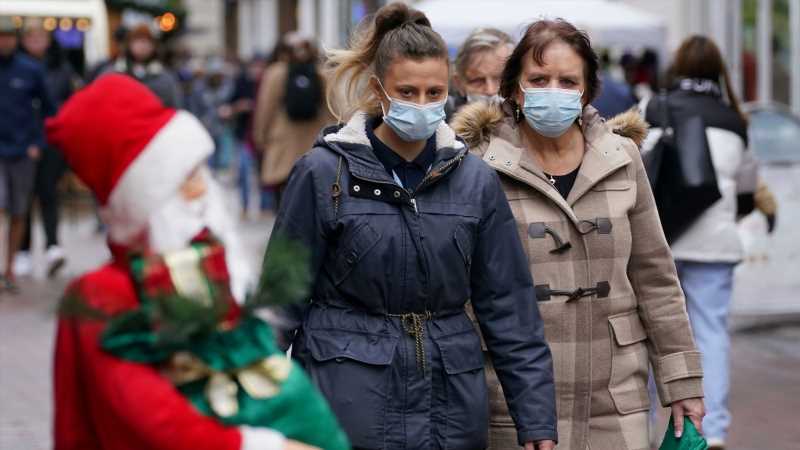Boris Johnson has toughened coronavirus measures in England amid concern over the increasing spread of the Omicron variant.
Speaking at a Downing Street news conference on Wednesday evening, the prime minister announced the measures in the government’s “Plan B” for dealing with COVID-19 this winter.
The new COVID restrictions being implemented in England include:
• The reintroduction of the work from home order, for those who can, from Monday
• The extension of mandatory face mask wearing to “most public indoor venues”, including theatres and cinemas, from Friday. However, there will be exemptions “where it is not practical”, such as when eating, drinking, exercising or singing
• The NHS COVID pass, commonly referred to as a vaccine passport, will be made mandatory in a week’s time for nightclubs and venues with large crowds. People will be able to use the pass to show either proof of two vaccine doses or a negative lateral flow test result
• The introduction of daily tests for people who are contacts of Omicron cases, instead of isolation.
Mr Johnson said it had become “increasingly clear” that Omicron, first detected in South Africa, is “growing much faster” than the previous Delta variant and was “spreading rapidly all around the world”.
He added it was “the proportionate and the responsible thing” to introduce stronger COVID restrictions.
Earlier on Wednesday, it was revealed that another 131 cases of Omicron – which is feared to be more transmissible than the Delta variant – had been recorded across the UK, taking the total to 568.
It marks the second day in a row that more than 100 cases of the new variant have been reported.
But Mr Johnson warned the “true number” of Omicron cases was “certain to be much higher” with “evidence that the doubling time of Omicron in the UK could currently be between two and three days”.
The prime minister added that, while there were “some limits” to what could be learned from South Africa, the UK was seeing a growth in cases that “mirrors the rapid increases previously seen in South Africa”.
“South Africa is also seeing hospitalisations roughly doubling in a week, meaning that we can’t yet assume Omicron is less severe than previous variants,” Mr Johnson said.
He acknowledged the “remorseless logic of exponential growth” of Omicron in the UK could lead to “a big rise in hospitalisations and therefore, sadly, in deaths”.
The prime minister said the “single biggest thing that every one of us can do” was to get vaccinacted and “crucially” to get a booster dose as soon as invited to do so.
“If and indeed as soon as it becomes clear that the boosters are capable of holding this Omicron variant, and we have boosted enough people to do that job, then we will be able to move forward as before,” Mr Johnson added.
In total, the UK has recorded 51,342 new COVID cases in the last 24 hours and a further 161 people have died within 28 days of testing positive for coronavirus.
Mr Johnson made the announcement of fresh COVID measures as he deals with a furious row over an alleged Christmas party in 10 Downing Street last December, when strict coronavirus rules were in place.
Amid the scandal, the prime minister has faced the charge he is implementing stronger COVID measures as a “diversionary tactic”.
In a document published in September, the government’s “Plan B” for dealing with winter pressures in the NHS stated that contingency measures to deal with COVID-19 would include a strengthening of government messaging, the possible introduction of COVID vaccine passports for some events, mandatory face mask wearing, and a return to work from home guidance.
Follow the Daily podcast on Apple Podcasts, Google Podcasts, Spotify, Spreaker
Mr Johnson had already reintroduced mandatory face mask wearing on public transport and in shops, as well as other settings in England, following the discovery of the Omicron variant last month.
He has also recently toughened travel restrictions and put a number of African countries on the travel red list.
Source: Read Full Article
